Reflective Journal: Skills Developed Through Task Completion
VerifiedAdded on 2023/01/10
|7
|2032
|49
Journal and Reflective Writing
AI Summary
This reflective journal analyzes the development of employability skills through the completion of a task. The journal details the acquisition and enhancement of various skills, including communication (written and verbal), research, time and self-management, teamwork, and problem-solving. The student reflects on how these skills were developed through a team-based assignment, referencing Kolb's Experiential Learning Cycle to illustrate the learning process. The task involved researching the leadership style of Jeff Bezos, the CEO of Amazon, and the student discusses the practical application of ICTs and the importance of effective communication. The journal concludes that the task contributed significantly to the student's confidence and overall efficiency, preparing them for future academic and professional endeavors.
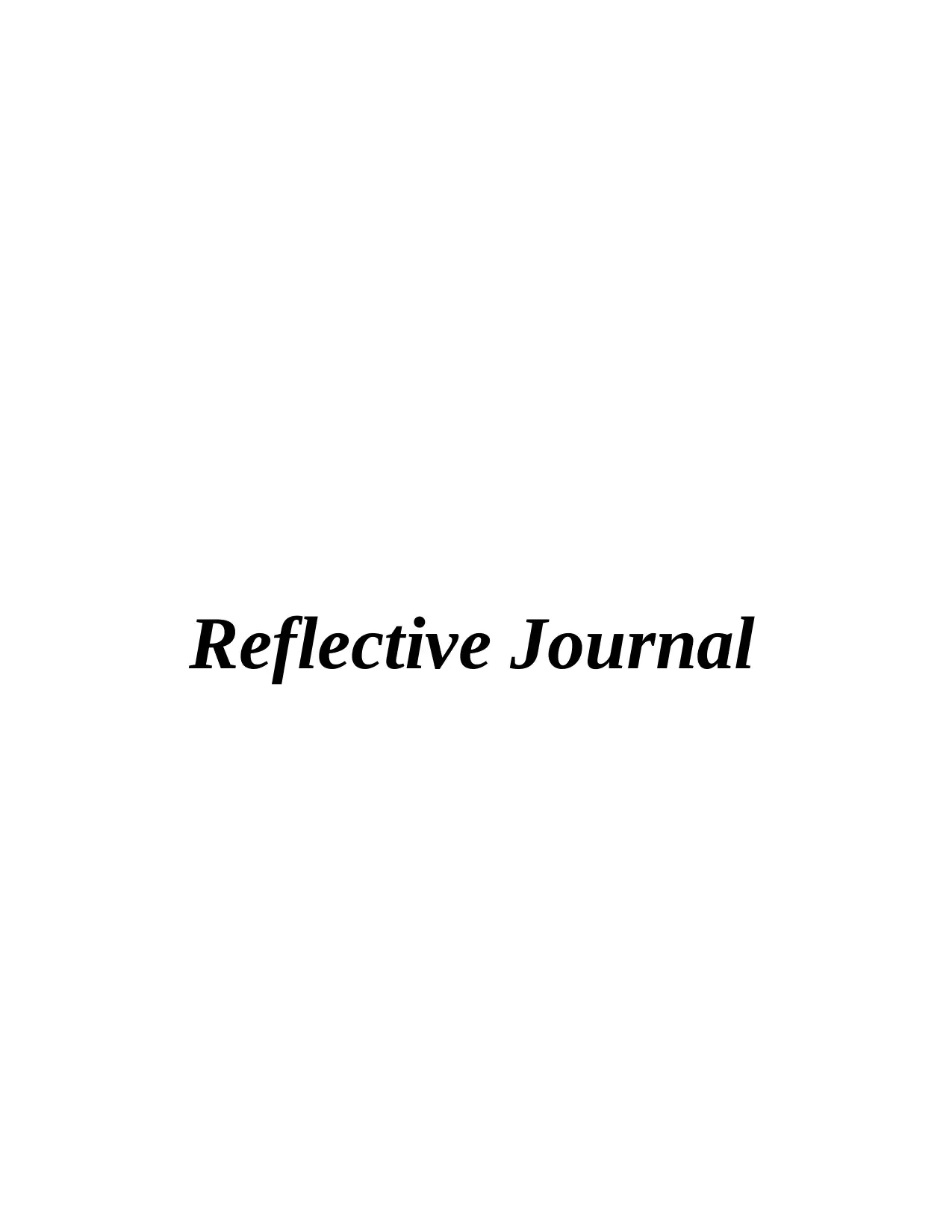
Reflective Journal
Paraphrase This Document
Need a fresh take? Get an instant paraphrase of this document with our AI Paraphraser
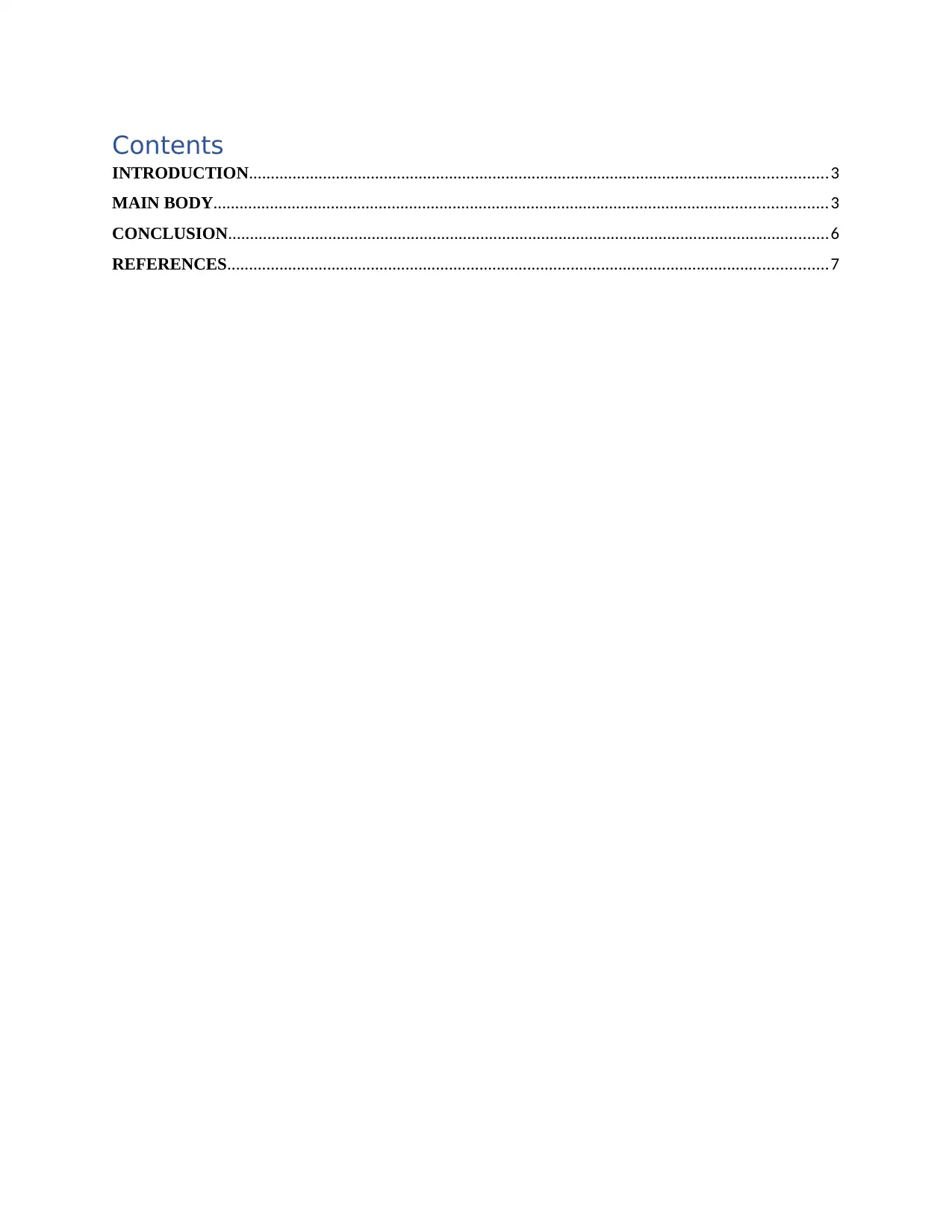
Contents
INTRODUCTION.....................................................................................................................................3
MAIN BODY.............................................................................................................................................3
CONCLUSION..........................................................................................................................................6
REFERENCES..........................................................................................................................................7
INTRODUCTION.....................................................................................................................................3
MAIN BODY.............................................................................................................................................3
CONCLUSION..........................................................................................................................................6
REFERENCES..........................................................................................................................................7
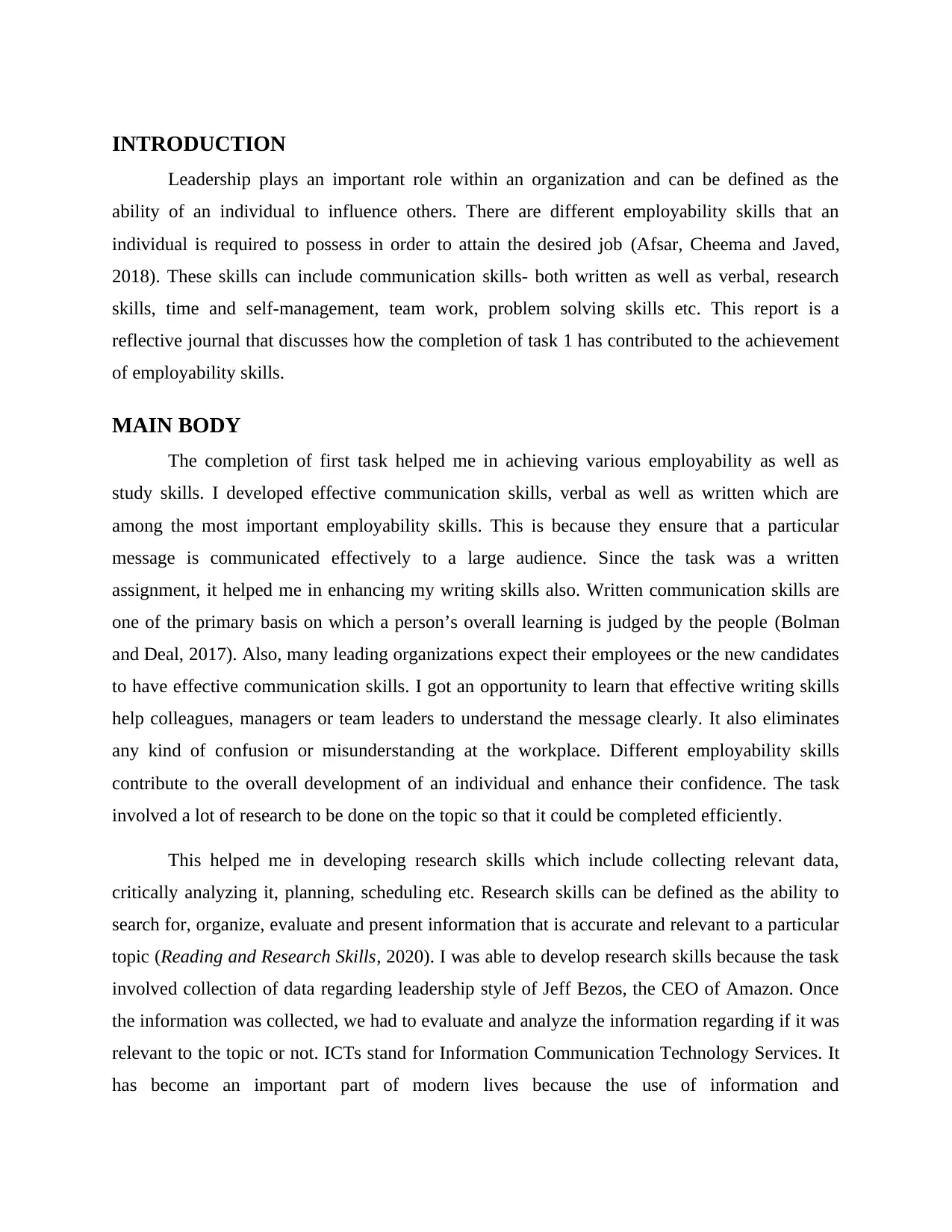
INTRODUCTION
Leadership plays an important role within an organization and can be defined as the
ability of an individual to influence others. There are different employability skills that an
individual is required to possess in order to attain the desired job (Afsar, Cheema and Javed,
2018). These skills can include communication skills- both written as well as verbal, research
skills, time and self-management, team work, problem solving skills etc. This report is a
reflective journal that discusses how the completion of task 1 has contributed to the achievement
of employability skills.
MAIN BODY
The completion of first task helped me in achieving various employability as well as
study skills. I developed effective communication skills, verbal as well as written which are
among the most important employability skills. This is because they ensure that a particular
message is communicated effectively to a large audience. Since the task was a written
assignment, it helped me in enhancing my writing skills also. Written communication skills are
one of the primary basis on which a person’s overall learning is judged by the people (Bolman
and Deal, 2017). Also, many leading organizations expect their employees or the new candidates
to have effective communication skills. I got an opportunity to learn that effective writing skills
help colleagues, managers or team leaders to understand the message clearly. It also eliminates
any kind of confusion or misunderstanding at the workplace. Different employability skills
contribute to the overall development of an individual and enhance their confidence. The task
involved a lot of research to be done on the topic so that it could be completed efficiently.
This helped me in developing research skills which include collecting relevant data,
critically analyzing it, planning, scheduling etc. Research skills can be defined as the ability to
search for, organize, evaluate and present information that is accurate and relevant to a particular
topic (Reading and Research Skills, 2020). I was able to develop research skills because the task
involved collection of data regarding leadership style of Jeff Bezos, the CEO of Amazon. Once
the information was collected, we had to evaluate and analyze the information regarding if it was
relevant to the topic or not. ICTs stand for Information Communication Technology Services. It
has become an important part of modern lives because the use of information and
Leadership plays an important role within an organization and can be defined as the
ability of an individual to influence others. There are different employability skills that an
individual is required to possess in order to attain the desired job (Afsar, Cheema and Javed,
2018). These skills can include communication skills- both written as well as verbal, research
skills, time and self-management, team work, problem solving skills etc. This report is a
reflective journal that discusses how the completion of task 1 has contributed to the achievement
of employability skills.
MAIN BODY
The completion of first task helped me in achieving various employability as well as
study skills. I developed effective communication skills, verbal as well as written which are
among the most important employability skills. This is because they ensure that a particular
message is communicated effectively to a large audience. Since the task was a written
assignment, it helped me in enhancing my writing skills also. Written communication skills are
one of the primary basis on which a person’s overall learning is judged by the people (Bolman
and Deal, 2017). Also, many leading organizations expect their employees or the new candidates
to have effective communication skills. I got an opportunity to learn that effective writing skills
help colleagues, managers or team leaders to understand the message clearly. It also eliminates
any kind of confusion or misunderstanding at the workplace. Different employability skills
contribute to the overall development of an individual and enhance their confidence. The task
involved a lot of research to be done on the topic so that it could be completed efficiently.
This helped me in developing research skills which include collecting relevant data,
critically analyzing it, planning, scheduling etc. Research skills can be defined as the ability to
search for, organize, evaluate and present information that is accurate and relevant to a particular
topic (Reading and Research Skills, 2020). I was able to develop research skills because the task
involved collection of data regarding leadership style of Jeff Bezos, the CEO of Amazon. Once
the information was collected, we had to evaluate and analyze the information regarding if it was
relevant to the topic or not. ICTs stand for Information Communication Technology Services. It
has become an important part of modern lives because the use of information and
⊘ This is a preview!⊘
Do you want full access?
Subscribe today to unlock all pages.

Trusted by 1+ million students worldwide
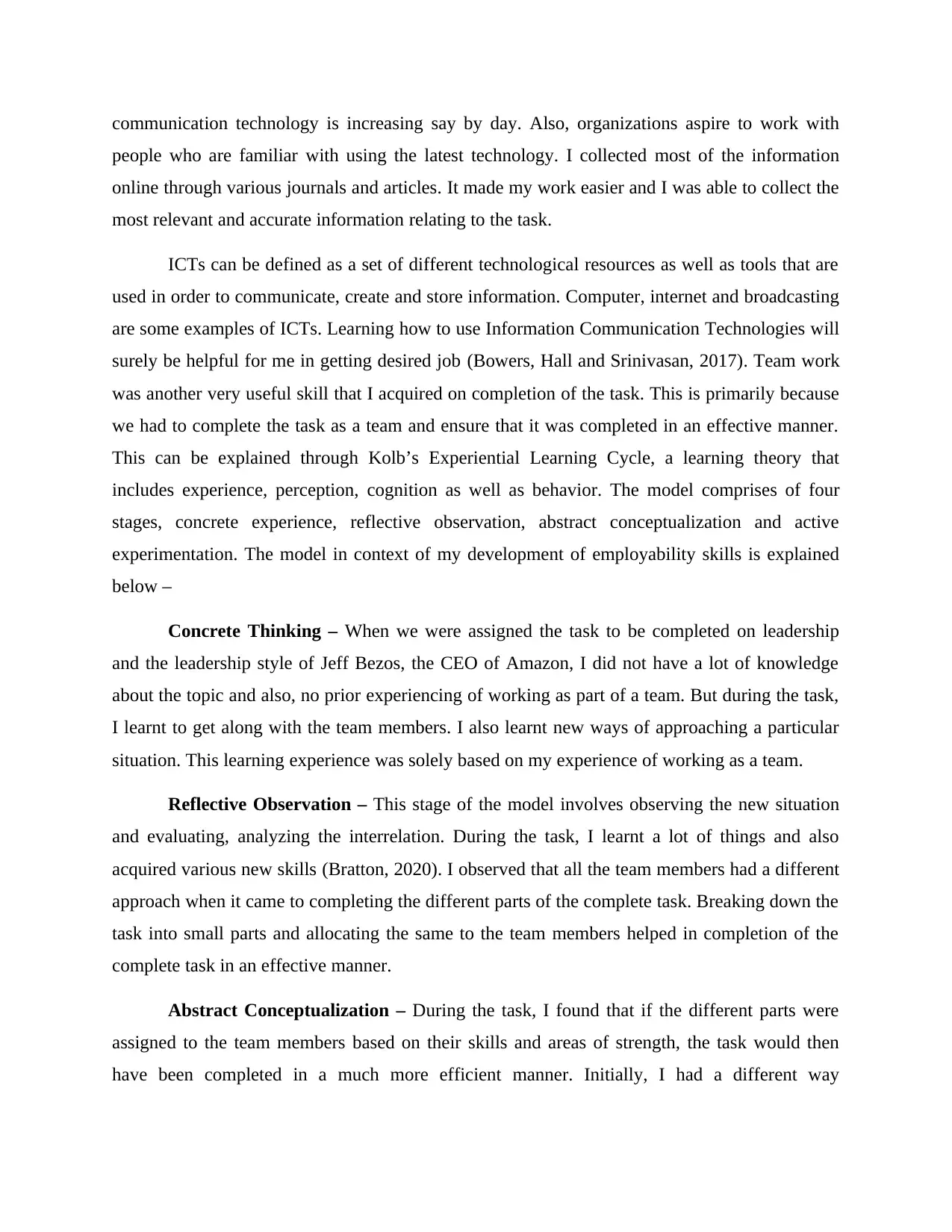
communication technology is increasing say by day. Also, organizations aspire to work with
people who are familiar with using the latest technology. I collected most of the information
online through various journals and articles. It made my work easier and I was able to collect the
most relevant and accurate information relating to the task.
ICTs can be defined as a set of different technological resources as well as tools that are
used in order to communicate, create and store information. Computer, internet and broadcasting
are some examples of ICTs. Learning how to use Information Communication Technologies will
surely be helpful for me in getting desired job (Bowers, Hall and Srinivasan, 2017). Team work
was another very useful skill that I acquired on completion of the task. This is primarily because
we had to complete the task as a team and ensure that it was completed in an effective manner.
This can be explained through Kolb’s Experiential Learning Cycle, a learning theory that
includes experience, perception, cognition as well as behavior. The model comprises of four
stages, concrete experience, reflective observation, abstract conceptualization and active
experimentation. The model in context of my development of employability skills is explained
below –
Concrete Thinking – When we were assigned the task to be completed on leadership
and the leadership style of Jeff Bezos, the CEO of Amazon, I did not have a lot of knowledge
about the topic and also, no prior experiencing of working as part of a team. But during the task,
I learnt to get along with the team members. I also learnt new ways of approaching a particular
situation. This learning experience was solely based on my experience of working as a team.
Reflective Observation – This stage of the model involves observing the new situation
and evaluating, analyzing the interrelation. During the task, I learnt a lot of things and also
acquired various new skills (Bratton, 2020). I observed that all the team members had a different
approach when it came to completing the different parts of the complete task. Breaking down the
task into small parts and allocating the same to the team members helped in completion of the
complete task in an effective manner.
Abstract Conceptualization – During the task, I found that if the different parts were
assigned to the team members based on their skills and areas of strength, the task would then
have been completed in a much more efficient manner. Initially, I had a different way
people who are familiar with using the latest technology. I collected most of the information
online through various journals and articles. It made my work easier and I was able to collect the
most relevant and accurate information relating to the task.
ICTs can be defined as a set of different technological resources as well as tools that are
used in order to communicate, create and store information. Computer, internet and broadcasting
are some examples of ICTs. Learning how to use Information Communication Technologies will
surely be helpful for me in getting desired job (Bowers, Hall and Srinivasan, 2017). Team work
was another very useful skill that I acquired on completion of the task. This is primarily because
we had to complete the task as a team and ensure that it was completed in an effective manner.
This can be explained through Kolb’s Experiential Learning Cycle, a learning theory that
includes experience, perception, cognition as well as behavior. The model comprises of four
stages, concrete experience, reflective observation, abstract conceptualization and active
experimentation. The model in context of my development of employability skills is explained
below –
Concrete Thinking – When we were assigned the task to be completed on leadership
and the leadership style of Jeff Bezos, the CEO of Amazon, I did not have a lot of knowledge
about the topic and also, no prior experiencing of working as part of a team. But during the task,
I learnt to get along with the team members. I also learnt new ways of approaching a particular
situation. This learning experience was solely based on my experience of working as a team.
Reflective Observation – This stage of the model involves observing the new situation
and evaluating, analyzing the interrelation. During the task, I learnt a lot of things and also
acquired various new skills (Bratton, 2020). I observed that all the team members had a different
approach when it came to completing the different parts of the complete task. Breaking down the
task into small parts and allocating the same to the team members helped in completion of the
complete task in an effective manner.
Abstract Conceptualization – During the task, I found that if the different parts were
assigned to the team members based on their skills and areas of strength, the task would then
have been completed in a much more efficient manner. Initially, I had a different way
Paraphrase This Document
Need a fresh take? Get an instant paraphrase of this document with our AI Paraphraser
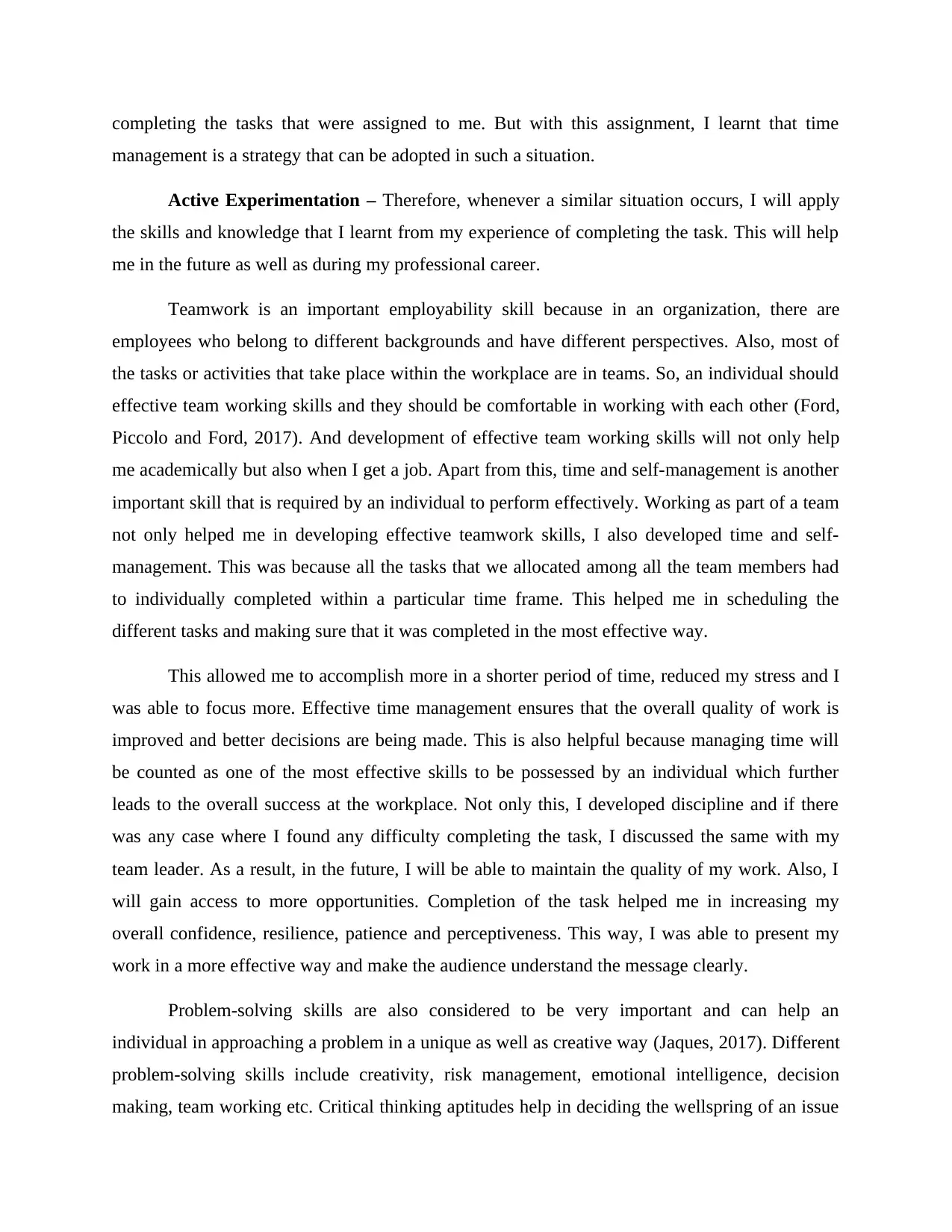
completing the tasks that were assigned to me. But with this assignment, I learnt that time
management is a strategy that can be adopted in such a situation.
Active Experimentation – Therefore, whenever a similar situation occurs, I will apply
the skills and knowledge that I learnt from my experience of completing the task. This will help
me in the future as well as during my professional career.
Teamwork is an important employability skill because in an organization, there are
employees who belong to different backgrounds and have different perspectives. Also, most of
the tasks or activities that take place within the workplace are in teams. So, an individual should
effective team working skills and they should be comfortable in working with each other (Ford,
Piccolo and Ford, 2017). And development of effective team working skills will not only help
me academically but also when I get a job. Apart from this, time and self-management is another
important skill that is required by an individual to perform effectively. Working as part of a team
not only helped me in developing effective teamwork skills, I also developed time and self-
management. This was because all the tasks that we allocated among all the team members had
to individually completed within a particular time frame. This helped me in scheduling the
different tasks and making sure that it was completed in the most effective way.
This allowed me to accomplish more in a shorter period of time, reduced my stress and I
was able to focus more. Effective time management ensures that the overall quality of work is
improved and better decisions are being made. This is also helpful because managing time will
be counted as one of the most effective skills to be possessed by an individual which further
leads to the overall success at the workplace. Not only this, I developed discipline and if there
was any case where I found any difficulty completing the task, I discussed the same with my
team leader. As a result, in the future, I will be able to maintain the quality of my work. Also, I
will gain access to more opportunities. Completion of the task helped me in increasing my
overall confidence, resilience, patience and perceptiveness. This way, I was able to present my
work in a more effective way and make the audience understand the message clearly.
Problem-solving skills are also considered to be very important and can help an
individual in approaching a problem in a unique as well as creative way (Jaques, 2017). Different
problem-solving skills include creativity, risk management, emotional intelligence, decision
making, team working etc. Critical thinking aptitudes help in deciding the wellspring of an issue
management is a strategy that can be adopted in such a situation.
Active Experimentation – Therefore, whenever a similar situation occurs, I will apply
the skills and knowledge that I learnt from my experience of completing the task. This will help
me in the future as well as during my professional career.
Teamwork is an important employability skill because in an organization, there are
employees who belong to different backgrounds and have different perspectives. Also, most of
the tasks or activities that take place within the workplace are in teams. So, an individual should
effective team working skills and they should be comfortable in working with each other (Ford,
Piccolo and Ford, 2017). And development of effective team working skills will not only help
me academically but also when I get a job. Apart from this, time and self-management is another
important skill that is required by an individual to perform effectively. Working as part of a team
not only helped me in developing effective teamwork skills, I also developed time and self-
management. This was because all the tasks that we allocated among all the team members had
to individually completed within a particular time frame. This helped me in scheduling the
different tasks and making sure that it was completed in the most effective way.
This allowed me to accomplish more in a shorter period of time, reduced my stress and I
was able to focus more. Effective time management ensures that the overall quality of work is
improved and better decisions are being made. This is also helpful because managing time will
be counted as one of the most effective skills to be possessed by an individual which further
leads to the overall success at the workplace. Not only this, I developed discipline and if there
was any case where I found any difficulty completing the task, I discussed the same with my
team leader. As a result, in the future, I will be able to maintain the quality of my work. Also, I
will gain access to more opportunities. Completion of the task helped me in increasing my
overall confidence, resilience, patience and perceptiveness. This way, I was able to present my
work in a more effective way and make the audience understand the message clearly.
Problem-solving skills are also considered to be very important and can help an
individual in approaching a problem in a unique as well as creative way (Jaques, 2017). Different
problem-solving skills include creativity, risk management, emotional intelligence, decision
making, team working etc. Critical thinking aptitudes help in deciding the wellspring of an issue
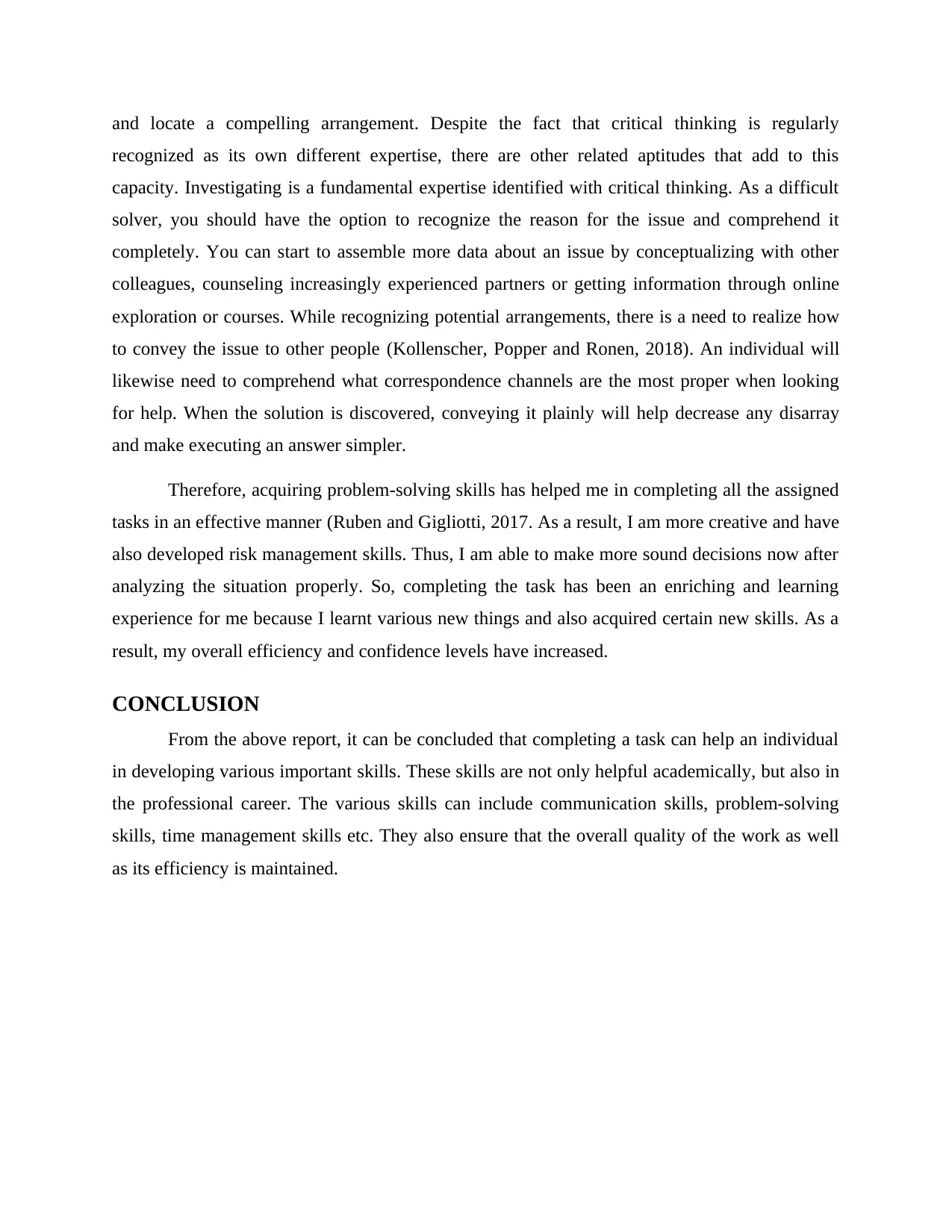
and locate a compelling arrangement. Despite the fact that critical thinking is regularly
recognized as its own different expertise, there are other related aptitudes that add to this
capacity. Investigating is a fundamental expertise identified with critical thinking. As a difficult
solver, you should have the option to recognize the reason for the issue and comprehend it
completely. You can start to assemble more data about an issue by conceptualizing with other
colleagues, counseling increasingly experienced partners or getting information through online
exploration or courses. While recognizing potential arrangements, there is a need to realize how
to convey the issue to other people (Kollenscher, Popper and Ronen, 2018). An individual will
likewise need to comprehend what correspondence channels are the most proper when looking
for help. When the solution is discovered, conveying it plainly will help decrease any disarray
and make executing an answer simpler.
Therefore, acquiring problem-solving skills has helped me in completing all the assigned
tasks in an effective manner (Ruben and Gigliotti, 2017. As a result, I am more creative and have
also developed risk management skills. Thus, I am able to make more sound decisions now after
analyzing the situation properly. So, completing the task has been an enriching and learning
experience for me because I learnt various new things and also acquired certain new skills. As a
result, my overall efficiency and confidence levels have increased.
CONCLUSION
From the above report, it can be concluded that completing a task can help an individual
in developing various important skills. These skills are not only helpful academically, but also in
the professional career. The various skills can include communication skills, problem-solving
skills, time management skills etc. They also ensure that the overall quality of the work as well
as its efficiency is maintained.
recognized as its own different expertise, there are other related aptitudes that add to this
capacity. Investigating is a fundamental expertise identified with critical thinking. As a difficult
solver, you should have the option to recognize the reason for the issue and comprehend it
completely. You can start to assemble more data about an issue by conceptualizing with other
colleagues, counseling increasingly experienced partners or getting information through online
exploration or courses. While recognizing potential arrangements, there is a need to realize how
to convey the issue to other people (Kollenscher, Popper and Ronen, 2018). An individual will
likewise need to comprehend what correspondence channels are the most proper when looking
for help. When the solution is discovered, conveying it plainly will help decrease any disarray
and make executing an answer simpler.
Therefore, acquiring problem-solving skills has helped me in completing all the assigned
tasks in an effective manner (Ruben and Gigliotti, 2017. As a result, I am more creative and have
also developed risk management skills. Thus, I am able to make more sound decisions now after
analyzing the situation properly. So, completing the task has been an enriching and learning
experience for me because I learnt various new things and also acquired certain new skills. As a
result, my overall efficiency and confidence levels have increased.
CONCLUSION
From the above report, it can be concluded that completing a task can help an individual
in developing various important skills. These skills are not only helpful academically, but also in
the professional career. The various skills can include communication skills, problem-solving
skills, time management skills etc. They also ensure that the overall quality of the work as well
as its efficiency is maintained.
⊘ This is a preview!⊘
Do you want full access?
Subscribe today to unlock all pages.

Trusted by 1+ million students worldwide
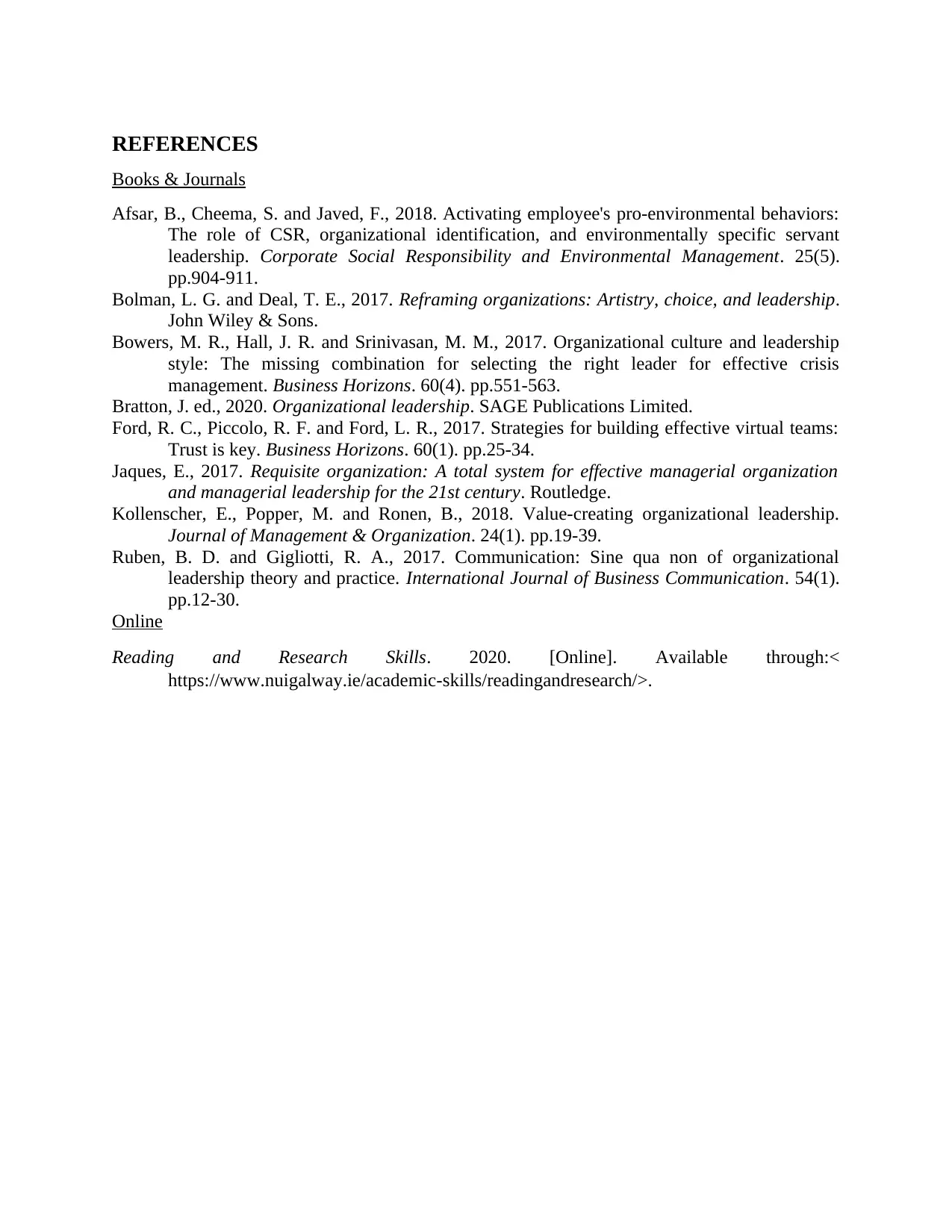
REFERENCES
Books & Journals
Afsar, B., Cheema, S. and Javed, F., 2018. Activating employee's pro‐environmental behaviors:
The role of CSR, organizational identification, and environmentally specific servant
leadership. Corporate Social Responsibility and Environmental Management. 25(5).
pp.904-911.
Bolman, L. G. and Deal, T. E., 2017. Reframing organizations: Artistry, choice, and leadership.
John Wiley & Sons.
Bowers, M. R., Hall, J. R. and Srinivasan, M. M., 2017. Organizational culture and leadership
style: The missing combination for selecting the right leader for effective crisis
management. Business Horizons. 60(4). pp.551-563.
Bratton, J. ed., 2020. Organizational leadership. SAGE Publications Limited.
Ford, R. C., Piccolo, R. F. and Ford, L. R., 2017. Strategies for building effective virtual teams:
Trust is key. Business Horizons. 60(1). pp.25-34.
Jaques, E., 2017. Requisite organization: A total system for effective managerial organization
and managerial leadership for the 21st century. Routledge.
Kollenscher, E., Popper, M. and Ronen, B., 2018. Value-creating organizational leadership.
Journal of Management & Organization. 24(1). pp.19-39.
Ruben, B. D. and Gigliotti, R. A., 2017. Communication: Sine qua non of organizational
leadership theory and practice. International Journal of Business Communication. 54(1).
pp.12-30.
Online
Reading and Research Skills. 2020. [Online]. Available through:<
https://www.nuigalway.ie/academic-skills/readingandresearch/>.
Books & Journals
Afsar, B., Cheema, S. and Javed, F., 2018. Activating employee's pro‐environmental behaviors:
The role of CSR, organizational identification, and environmentally specific servant
leadership. Corporate Social Responsibility and Environmental Management. 25(5).
pp.904-911.
Bolman, L. G. and Deal, T. E., 2017. Reframing organizations: Artistry, choice, and leadership.
John Wiley & Sons.
Bowers, M. R., Hall, J. R. and Srinivasan, M. M., 2017. Organizational culture and leadership
style: The missing combination for selecting the right leader for effective crisis
management. Business Horizons. 60(4). pp.551-563.
Bratton, J. ed., 2020. Organizational leadership. SAGE Publications Limited.
Ford, R. C., Piccolo, R. F. and Ford, L. R., 2017. Strategies for building effective virtual teams:
Trust is key. Business Horizons. 60(1). pp.25-34.
Jaques, E., 2017. Requisite organization: A total system for effective managerial organization
and managerial leadership for the 21st century. Routledge.
Kollenscher, E., Popper, M. and Ronen, B., 2018. Value-creating organizational leadership.
Journal of Management & Organization. 24(1). pp.19-39.
Ruben, B. D. and Gigliotti, R. A., 2017. Communication: Sine qua non of organizational
leadership theory and practice. International Journal of Business Communication. 54(1).
pp.12-30.
Online
Reading and Research Skills. 2020. [Online]. Available through:<
https://www.nuigalway.ie/academic-skills/readingandresearch/>.
1 out of 7
Related Documents
Your All-in-One AI-Powered Toolkit for Academic Success.
+13062052269
info@desklib.com
Available 24*7 on WhatsApp / Email
![[object Object]](/_next/static/media/star-bottom.7253800d.svg)
Unlock your academic potential
Copyright © 2020–2026 A2Z Services. All Rights Reserved. Developed and managed by ZUCOL.




